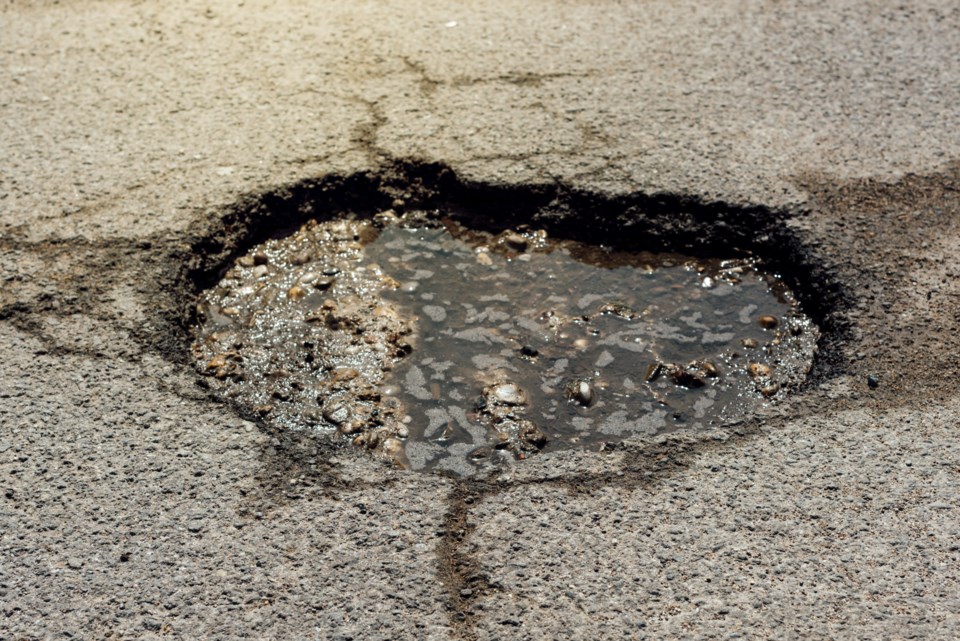Pothole claims against the city have taken a sharp downturn in 2020, after the number of claims in 2019 more than doubled the five-year average.
"Given the weather conditions experienced within the City of Greater Sudbury, pothole claims are inevitable," said an information report that was brought before the city's finance and administration committee on Nov. 17.
"The harsh winter conditions along with numerous freeze/thaw events; potholes do develop in the roadways."
In 2019, the city had 553 pothole claims and paid 72 of those claims at a total cost of $187,909, with $33,517 going to claimants and $154,392 in adjuster fees.
Those numbers were a sharp increase over the 2018 figures that saw the city take 234 pothole claims and pay out on just 26 claims at a cost of $91,467, with $13,032 going to claimants and $78,435 going to insurance adjusters.
Up to the end of August in 2020, there have been only 84 pothole claims, with the city paying just $4,150 to six claimants, with a total cost of $28,219 including adjuster fees.
"The reasons for the reduction in claims deals with the amount of investment made to our road system as well as fewer drivers on the road due to COVID-19," said the report. "The total investment to our roads; both capital and operational in 2018 and 2019 was approximately $140 million."
Ward 4 Coun. Geoff McCausland pointed to the spike in numbers in 2019, noting an emergency motion that was put forward by Ward 2 Coun. Michael Vagnini in March of 2019, which was followed by a town hall meeting and significant media coverage of the city's pothole issues.
"I have no doubt that this was an unintended consequence and with about five times the normal number of claims we did also see an increase of about three times the normal amount being paid out to claimants," said McCausland.
"The increased number of claims however does seem to have primarily resulted in an increased cost to the city and thereby Greater Sudburians to pay insurance adjusters. Is there any way that we can perform some kind of pre-screening of these submissions so that we can potentially avoid paying for insurance adjusters in certain cases, more specifically can we identify cases that have virtually zero chance of success and preclude them from being submitted?"
Robert Walz, the city's coordinator of insurance and risk management, explained that while this option was not out of the question it wouldn't necessarily protect the city from paying legal fees and could actually cost more in the long run.
"We gather information for the adjuster, but as far as a pre-determination, we would really need to increase our own staff here. We're busy enough with 100 claims ... we would have internal costs that I honestly believe would exceed what we're paying the adjusters for this," said Walz.
"If we had a pre-determination, people still have a right to submit a claim whether we pre-determine it or not and they still have a right to go to small claims court, so it may force people to push it on further. Therefore, we're getting into costs for junior lawyers or senior adjusters to handle it in small claims."
Every time a pothole claim is made, the city is obligated to respond and do so with a licensed insurance adjuster, though the city has a number of protections in place that have resulted in them only paying about 12 per cent of all claimants.
"The work is done in accordance with the Municipal Act through the provincial minimum maintenance standards; what's happened is the province of Ontario has set the rules as far as dealing with pothole claims," said Walz.
"The province has given the municipality protection under this act. Any decision with respect to claims are not made by the municipality, it's made by the adjusters, but it depends on the class of roadways as far as how these claims are managed."
Walz explained that any roadway that falls under Class One or Class Two allows the city four days to repair a pothole.
"They're rated on the amount of traffic flow and the speed," said Walz. "For example, Barrydowne would go from a Two where it's busiest to a Four. A Class One and Two, once the city knows there's a pothole there, the roads department would have four days under the minimum maintenance standards to repair that pothole."
The city is required to go through numerous roadway inspection reports on a regular basis and ensure that the standards set out in the Municipal Act are met. Additionally, staff has to review 311 calls from citizens about potholes on the city's road network and make sure that they're repaired within the allowed timeframe in order to protect themselves from having to pay claimants whose vehicles are damaged by potholes.
"Once the city knows about a pothole, in the case of a Class Two roadway, the city has four days to repair it. So if we don't meet that standard, that's where we pay the claim," said Walz. "If we meet those standards, that's when a pothole claim is not paid, so it's all a matter of timing. On average it's been about 12 per cent of the claims get paid, so what it means is our road crews are doing their diligence in meeting the standards set by the province."
The city also has protections in place against pothole claims in construction zones, as the contractors assume all liability with respect to the road conditions.
